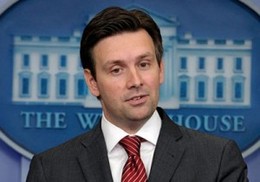The White House said if Congress goes ahead with Iran vote, and lawmakers reject the successful conclusion of nuclear talks, it will be “devastating” for the United States’ global standing.
The White House said if Congress goes ahead with Iran vote, and lawmakers reject the successful conclusion of nuclear talks, it will be “devastating” for the United States’ global standing.
“For the United States, because of a congressional action, to isolate our country on such an important issue, would be devastating to our standing in the world,” White House spokesman Josh Earnest said on Friday. 
“If Congress killed this agreement, it would have a terrible impact.”
After 18 days of intensive talks, Iran and the P5+1 group of countries - the US, Britain, France, Russia, China, and Germany – announced the conclusion of nuclear negotiations in the Austrian capital, Vienna, on July 14.
According to the text of the Joint Comprehensive Plan of Action (JCPOA), Iran will be recognized by the United Nations as a nuclear power and will continue its uranium enrichment program.
The White House has launched a sales pitch to the Republican-dominated Congress, which remains skeptical of the nuclear accord with Iran, and has 60 days to vote to either approve or disapprove it.
Most Republicans oppose the nuclear agreement with Iran, but they need a two-thirds vote in both chambers of Congress to override a possible presidential veto, and to reach that threshold, Republicans need Democratic support.
The White House spokesman said international sanctions imposed against Iran would “collapse” if Congress votes against the nuclear agreement, removing any leverage the P5+1 group has in enforcing restrictions on Iran’s nuclear activities.
“Iran would still obtain the financial benefits of sanctions relief,” he added.
“Iran will get all of the benefits of this deal without having to give up anything.”
The United States and its allies have imposed illegal sanctions on Iran based on the unfounded accusation that Tehran is pursuing non-civilian objectives in its nuclear program.
Iran rejects the allegation, arguing that as a committed signatory to the nuclear Non-Proliferation Treaty (NPT) and a member of the International Atomic Energy Agency (IAEA), it has the right to use nuclear technology for peaceful purposes.
In addition, the IAEA has conducted numerous inspections of Iran's nuclear facilities but has never found any evidence showing that Iran's civilian nuclear program has been diverted to nuclear weapons production.
